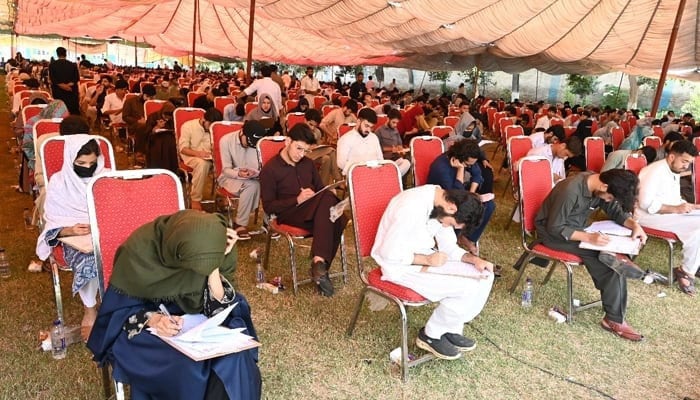FIA finds MDCAT exam leaked before start, Senate panel told
Committee Chairman directs PMDC officials to present comprehensive plan for implementing IT-based admission test
ISLAMABAD: In contrast to the Intelligence Bureau findings, the Federal Investigation Agency (FIA) has confirmed that the MDCAT exam in Karachi was leaked at 8:16 pm., nearly 14 hours before the scheduled start of the admission test organized by the Dow University of Health Sciences (DUHS), Pakistan Medical and Dental Council (PMDC) officials informed the Senate Standing Committee on Health on Thursday.
The forensic report by the FIA’s cyber-crime wing prompted the Sindh High Court to order a re-holding of MDCAT 2024 in Sindh, tentatively set for December 1, to be conducted by IBA Sukkur. “To prevent future paper leaks, the PMDC is working on a plan to directly conduct next year’s medical and dental college admission tests. We are consulting with the IT firms and national universities’ computer science departments to establish an IT-based, internationally standardized examination format that minimizes the chance of cheating or leaks,” PMDC President Prof. Rizwan Taj informed the committee.
Committee Chairman Senator Amir Chishti directed the PMDC officials to present a comprehensive plan for implementing an IT-based admission test nationwide by December 2024 for formal review and approval.
Senator Amir voiced concern over the students with marginal high school grades achieving high MDCAT scores and directed the PMDC to develop a plan for IT-based exams to curb cheating. He also suggested a public “Question Bank” to address the issue of out-of-syllabus questions. Further, the Senate Committee discussed disparities in the lab test charges, noting significant price variations in basic tests like lipid profiles and urine tests across private labs.Islamabad Healthcare Regulatory Authority (IHRA) Chief Executive Officer Dr Quaid Saeed said their act did not allow them to regulate the rates and charges of private medical institutions and laboratories. The committee members raised the issue of the huge disparity in the consultation fees charged by the medical consultants and claimed that many of them charge fees in cash, and in this way, they deprive the Federal Board of Revenue (FBR) of their income tax.
Senator Amir said instead of suggesting curbs on the private health sector, the authorities and parliamentarians should strive for the improvement of public sector health facilities. The committee also reviewed complaints from doctors at PIMS over allegations of racism, nepotism, workplace harassment, and abuse of authority. The committee recommended the ministry form an inquiry committee to investigate the claims and report its findings.
-
 King Charles Secretly Relies On Advice From THIS Royal
King Charles Secretly Relies On Advice From THIS Royal -
 Jennifer Garner Reveals Beauty Choice She Makes As Botox Alternative In Her 50s
Jennifer Garner Reveals Beauty Choice She Makes As Botox Alternative In Her 50s -
 Kate Middleton Drops Four-word Message For Young Girl After Wales Visit
Kate Middleton Drops Four-word Message For Young Girl After Wales Visit -
 Shamed Andrew Uncensored ‘massages’ Should Be Refunded To Public
Shamed Andrew Uncensored ‘massages’ Should Be Refunded To Public -
 Kylie Kelce Reveals Rules She Wants Daughter Bennett To Learn At 3: No More 'passies'
Kylie Kelce Reveals Rules She Wants Daughter Bennett To Learn At 3: No More 'passies' -
 Smartphone Market Set For Biggest-ever Decline In 2026
Smartphone Market Set For Biggest-ever Decline In 2026 -
 Mud, Rain, Loincloths: All About Japan’s 200-year-old Harvest Wrestling Ritual
Mud, Rain, Loincloths: All About Japan’s 200-year-old Harvest Wrestling Ritual -
 Jonathan Majors Set To Make Explosive Comeback To Acting After 2023 Conviction
Jonathan Majors Set To Make Explosive Comeback To Acting After 2023 Conviction -
 Next James Bond: Why Jacob Elordi May Never Get 007 Role?
Next James Bond: Why Jacob Elordi May Never Get 007 Role? -
 Maddox Drops Pitt From Surname In Credits Of Angelina Jolie’s New Film 'Couture' Despite Truce From Father's End In Legal Battle
Maddox Drops Pitt From Surname In Credits Of Angelina Jolie’s New Film 'Couture' Despite Truce From Father's End In Legal Battle -
 Meghan Markle Adds Diamonds To Engagement Ring For Jordan Trip
Meghan Markle Adds Diamonds To Engagement Ring For Jordan Trip -
 Burger King Launches AI Chatbot To Track Employee Politeness
Burger King Launches AI Chatbot To Track Employee Politeness -
 Andrew’s Woes Amid King Charles’ Cancer Battle Triggers Harry Into Action For ‘stiff Upper Lip’ Type Dad
Andrew’s Woes Amid King Charles’ Cancer Battle Triggers Harry Into Action For ‘stiff Upper Lip’ Type Dad -
 Experts Warn Andrew’s Legal Troubles In UK Could Be Far From Over
Experts Warn Andrew’s Legal Troubles In UK Could Be Far From Over -
 Teyana Taylor Reflects On Dreams Turning Into Reality Amid Major Score
Teyana Taylor Reflects On Dreams Turning Into Reality Amid Major Score -
 Jennifer Garner Drops Parenting Truth Bomb On Teens With Kylie Kelce: 'They're Amazing'
Jennifer Garner Drops Parenting Truth Bomb On Teens With Kylie Kelce: 'They're Amazing'




